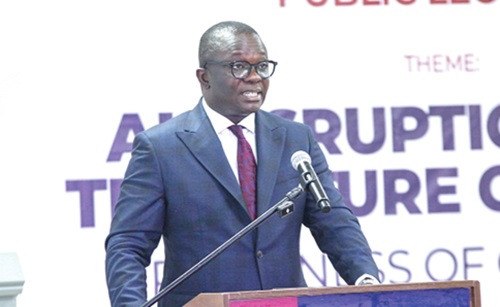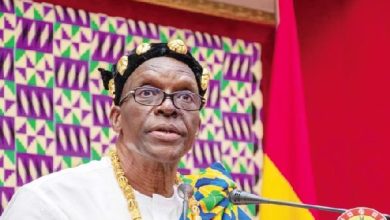National framework required for AI adoption
National framework required for AI adoption — Bryan Acheampong

Entrepreneur and security expert, Dr Bryan Acheampong, has called for a national framework towards the adoption of artificial intelligence (AI) for economic transformation, job creation, and improving public sector efficiency.
He said the country was lagging behind in the adoption of the novel technology, not because it lacked talent or ideas, adding, “We are lagging behind because we lack a coherent national posture on AI”.
Delivering a lecture at The University of Media, Arts and Communication (UniMAC) in Accra yesterday, Dr Acheampong, who is also the Member of Parliament (MP) for Abetifi and immediate past Minister of Food and Agriculture, stated that the country must have a structured vision that linked AI adoption to economic transformation, job creation and public sector efficiency.
“Without such a framework, we risk becoming permanent consumers of technologies developed in vastly different social and cultural contexts — tools built on datasets, assumptions and norms that may not resonate with or serve our realities,” he stated in the lecture, which was on the theme: “AI Disruptions and the Future of Work: Readiness of our Youth”.
He allayed the fears of many workers and students that AI might take away jobs, saying: “AI may change jobs, but it does not erase human value.
It replaces tasks, not people. It automates routine — but it also amplifies creativity.
The future doesn’t belong to machines. It belongs to humans who know how to work with machines.”
Lecture
The lecture, part of UniMAC’s Distinguished Speakers Series, which was organised by the Faculty of Public Relations, Advertising and Marketing (FOPAM), comes at a pivotal moment as governments worldwide grapple with AI regulation and ethics.
The Rector of UniMAC’s Institute of Journalism, Prof. Christiana Hammond; the Pro-Vice-Chancellor of UniMAC, Prof. Winston Abroampa; the Rector of UniMAC’s Institute of Film and Television, Prof. Samuel Manasseh Yirenkyi, and the Rector of UniMAC’s Institute of Languages, Prof. Cecilia Addai, were present.
Also in attendance were the Member of Parliament for Mpraeso, Davis Ansah Opoku; a former Deputy Minister of Trade and Industry, Nana Ama Dokua Asiamah Agyei, and a former Deputy Minister of Information, Pius Enam Hadzide, among others.
Caution
Addressing students, faculty, industry experts, policymakers and media professionals, the former Food and Agriculture Minister warned that the absence of a coordinated national policy could leave Ghana overly dependent on imported technologies, tools that may not reflect local realities or values.
Dr Acheampong stressed the importance of protecting data sovereignty and ensuring that AI systems deployed in Ghana were independent, transparent, inclusive and accountable.
He said while some countries in Africa, such as Rwanda, had already begun implementing national AI strategies, Ghana’s approach, according to him, remained fragmented although the country had made progress in digital inclusion through initiatives such as mobile money and the Ghana Card, stating that those efforts still fell short of preparing the nation for AI-driven disruption across sectors.
“Even closer to home, Rwanda has launched a national AI policy and is integrating AI into healthcare diagnostics and agricultural planning.
These developments raise an important question for us: where does Ghana stand in this rapidly changing landscape? To be honest, our position is not yet defined,” he said.
Dr Acheampong dismissed fears that AI would replace human jobs entirely, and pointed out that agriculture, education, public service and the creative industries as key areas where AI was already making a tangible impact.
“In agriculture, precision farming tools are helping to improve productivity and reduce post-harvest losses.
“In education, AI-powered platforms are reshaping how students learn and engage with content.
“In the media and creative economy, algorithms are influencing content creation, distribution and audience targeting,” Dr Acheampong, who holds a doctorate in Information System, said, “Ghana needs to catch up or fall behind”.
Catching up
To catch up with the AI revolution, Dr Acheampong proposed a Ghana Skills for AI Transition Plan, including curriculum reforms, teacher training, and AI sandboxes for students to experiment with emerging technologies.
“We need to shift from passive learning to participatory, inquiry-based education that prepares students for the jobs of tomorrow,” he said.
He outlined three fundamental pillars necessary for Ghana’s successful AI adoption: trust, skills, and institutional readiness.
The security and intelligence doctorate candidate added that building public trust in AI systems required transparency and demonstrable benefits to average Ghanaians while fostering adaptability and continuous learning.
He said the country also needed to create structures that could responsibly guide AI deployment while protecting citizens’ rights.
The Dean of FOPAM, Rev. Yaw Odame Gyau, described the lecture as “a wake-up call we cannot afford to ignore”.



